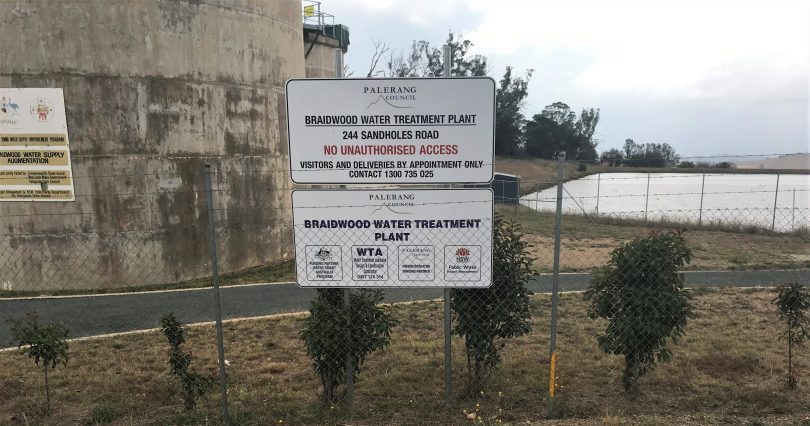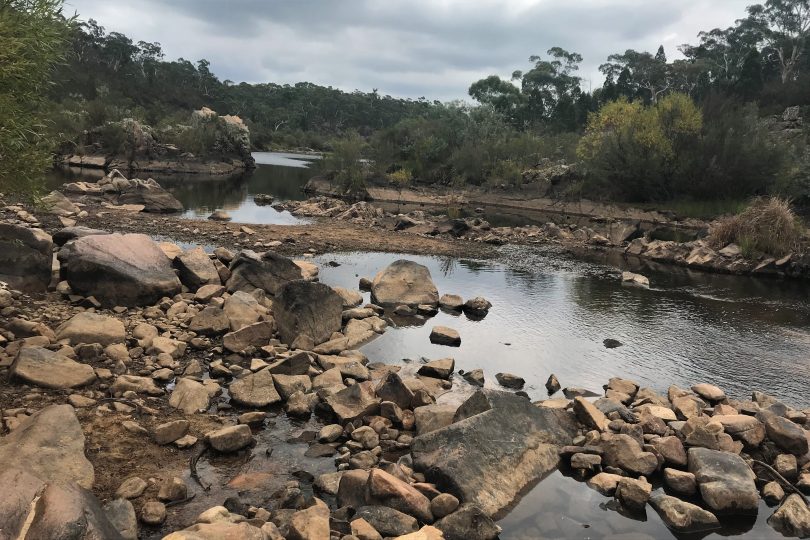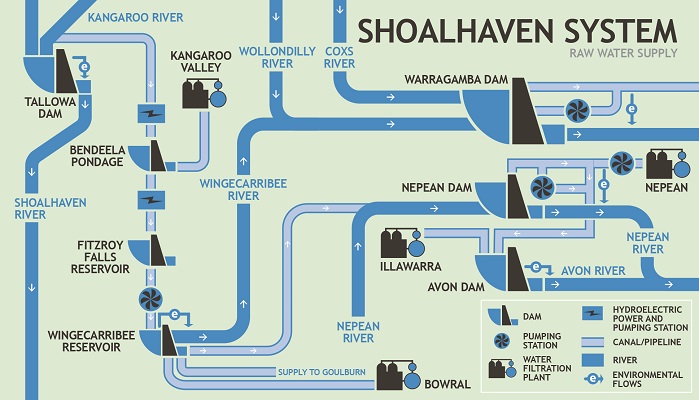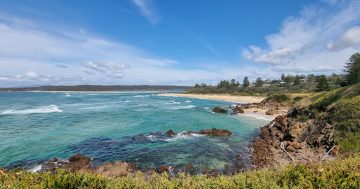
Braidwood’s water supply is dropping fast. Photo: Alex Rea.
Level 3 water restrictions are now in place for Braidwood as the ongoing drought sucks the upper Shoalhaven River dry.
Queanbeyan-Palerang Regional Council says Braidwood’s reservoir has dropped significantly, leaving the town with just months of water supply remaining.
For many Braidwood residents, fighting the North Black Range Bushfire has left dams dry with little water to fight flare-ups.
Water carters servicing rural properties surrounding Braidwood have been prohibited from drawing water from the Braidwood supply, and are forced to drive to Captains Flat and Bungendore to refill.
Here is a short video I made last Wednesday 27 November 2019 with local farmer Martin Royds to show the dire situation Braidwood faces with its water supply.
Posted by Paul Cockram on Thursday, November 28, 2019
Queanbeyan-Palerang Mayor Cr Tim Overall says water restrictions have been raised due to the rapidly declining water levels, forecasts of little or no rain in the next few months and the threat of bushfires.
“As the fires begin to subside, we must now face the reality that water usage has understandably, and very reasonably, been higher than we would have liked,” he says.
“That, combined with the Shoalhaven River rapidly declining, means that greater effort now needs to be made to conserve what water we have left.”
Braidwood’s water is pumped from the Shoalhaven River to an off-river storage dam before going through a treatment process and into the town water system.
The dam has a 72 megalitre (mL) capacity and is currently just under 85 per cent full. Braidwood is currently using water quicker than the Council can pump it from the river. When the river source is exhausted, the off-river dam will be the only remaining water.

The Shoalhaven River at Bombay, near where Braidwood’s water supply is sourced. Photo: Supplied.
“If water consumption stays as it currently is and there is no decent rain soon, water will likely run out in the first few months of next year,” says Mayor Overall.
Council is working with Government on options to prolong Braidwood’s water supply. This includes exemptions and changes to licensing arrangements to allow pumping of water from other sources as well as scaling back on Council’s own activities such as road works.
Council has already announced a temporary suspension of maintenance grading of unsealed rural roads because of the lack of water.
Council is also looking into options if a worst-case scenario eventuates and water sources are exhausted. Like other towns on severe water restrictions around the country, this would mean trucking water into Braidwood.
It’s not just Braidwood affected by the Shoalhaven’s demise.
The unassuming Shoalhaven River stretches for 327 km from the mountains south of Braidwood to the sea at Nowra. It is the lifeblood to communities and agriculture along the way and an essential contributor to the Sydney Catchment.
Among the Shoalhaven’s 34 tributaries are the pristine Mongarlowe River, the Corang, Endrick and Kangaroo rivers. Tallowa Dam on the Shoalhaven in the Southern Highlands is a source for Sydney’s drinking water after being pumped up to Lake Burragorang.
In early November, Braidwood’s resident weatherman Roger Hosking queried the reading of the Shoalhaven River water gauge at Warri Bridge.
The river data showed 58 mL per day, but the river appeared to have stopped. After checking, the true reading came back at 0.85 mL per day. Shortly after, water restrictions were introduced in Sydney.

Water Supply Diagram for the Shoalhaven River. Image: Sydney Water.
What level three water restrictions mean
Level 3 water restrictions set a 35 per cent reduction target based on the long-term average usage for this time of the year.
For the town of Braidwood, this means a total average daily usage target of 360 kilolitres.
The Level 3 restriction means sprinklers cannot be used and lawns cannot be watered. Gardens can only be watered by using a watering can or hand-held trigger nozzle. Watering can only be done between 7:00 am and 10:00 am and between 7:00 pm and 10:00 pm on alternate days under the odds and evens system.
Level three also means no emptying, filling or topping up of public or private swimming pools without written exemptions; no cleaning of paved areas, buildings or windows unless required due to an accident, fire or health hazard; no filling of water tanks with other than non-potable water; no washing of any vehicle except at commercial car washes that recycle water or hold an exemption; and other restrictions on use of water in construction.
Businesses and other users may apply for exemptions from the restrictions. These exemptions will be considered by staff on a case-by-case basis.
More info can be found at the Queanbeyan-Palerang Regional Council website.
Original Article published by Alex Rea on About Regional.













